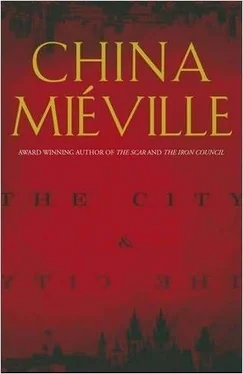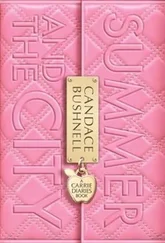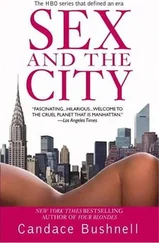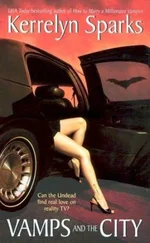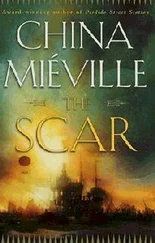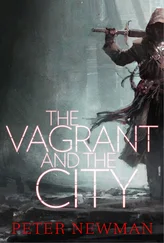Hamzinic opened his mouth, closed it again. I glanced up at him. He sadly shook his head: No nothing .
THE POSTERS WERE UP. Mostly around the area our Fulana was found but some in the main streets, in the shopping streets, in Kyezov and Topisza and areas like that. I even saw one when I left my flat.
It wasn’t even very close to the centre. I lived east and south a bit of the Old Town, the top-but-one flat in a six-storey towerlet on VulkovStrász. It is a heavily crosshatched street—clutch by clutch of architecture broken by alterity, even in a few spots house by house. The local buildings are taller by a floor or three than the others, so Besź juts up semiregularly and the roofscape is almost a machicolation.
Laced by the shadows of girdered towers that would loom over it if they were there, Ascension Church is at the end of VulkovStrász, its windows protected by wire grilles, but some of its stained panes broken. A fish market is there every few days. Regularly I would eat my breakfast to the shouts of vendors by their ice buckets and racks of live molluscs. Even the young women who worked there dressed like their grandmothers while behind their stalls, nostalgically photogenic, their hair tied up in dishcloth-coloured scarves, their filleting aprons in patterns of grey and red to minimise the stains of gutting. The men looked, misleadingly or not, straight off their boats, as if they had not put their catches down since they emerged from the sea, until they reached the cobbles below me. The punters in Besźel lingered and smelled and prodded the goods.
In the morning trains ran on a raised line metres from my window. They were not in my city. I did not of course, but I could have stared into the carriages—they were quite that close—and caught the eyes of foreign travellers.
They would have seen only a thin man in early middle age in dressing gown at his morning yoghurt and coffee, shake-folding a copy of a paper —Inkyistor or Iy Déurnem or a smudgy Besźel Journal to keep my English practiced. Usually alone—once in a while one or other of two women about his age might be there. (An economic historian at Besźel University; a writer for an art magazine. They did not know of each other but would not have minded.)
There when I left, a short distance from my front door on a poster stand, Fulana’s face watched me. Though her eyes were closed, they had cropped and tinkered with the picture so that she did not look dead but stupefied. Do you know this woman? it said. It was printed in black and white, on matte paper. Call Extreme Crime Squad , our number. The presence of the poster might be evidence that the local cops were particularly efficient. Maybe they were all over the borough. It might be that, knowing where I lived, they wanted to keep me off their back with one or two strategic placements, especially for my eyes.
It was a couple of kilometres to ECS base. I walked. I walked by the brick arches: at the top, where the lines were, they were elsewhere, but not all of them were foreign at their bases. The ones I could see contained little shops and squats decorated in art graffiti. In Besźel it was a quiet area, but the streets were crowded with those elsewhere. I unsaw them, but it took time to pick past them all. Before I had reached my turning on Via Camir, Yaszek called my mobile.
“We’ve found the van.”
I PICKED UP A CAB, which sped-stalled repeatedly through the traffic. The Pont Mahest was crowded, locally and elsewhere. I had minutes to look into the dirty river as we edged toward the western bank, the smoke and the grimy dockyard ships in the reflected light of mirrored buildings on a foreign waterfront—an enviable finance zone. Besź tugs bobbed in the wakes of ignored water taxis. The van was skew-whiff between buildings. It was not a lot that it was in, but a channel between the premises of an import-exporters and an office block, a stub of space full of trash and wolf shit, linking two larger streets. Crime-scene tape secured both ends—a slight impropriety, as the alley was really crosshatch, but rarely used, so the tape was a common rule-bend in such circumstances. My colleagues were faddling around the vehicle.
“Boss.” It was Yaszek.
“Is Corwi on her way?”
“Yeah, I gave her the info.” Yaszek said nothing about my commandeering of the junior officer. She walked me over. It was an old, beat-up VW, in very bad condition. It was more off-white than grey, but it was darkened with dirt.
“Are you done dusting?” I said. I put on rubber gloves. The mectecs nodded and worked around me.
“It was unlocked,” Yaszek said.
I opened the door. I prodded the split upholstery. A trinket on the dashboard—a hula-dancing plastic saint. I pulled open the glove compartment onto a battered road atlas and dirt. I splayed the pages of the book but there was nothing inside: it was the classic Besź driver’s aid, though an edition old enough to be black and white.
“So how do we know this is it?” Yaszek led me to the rear and pulled it open. I looked in on more dirt, a dank though not sick-making smell at least as much rust as mould, nylon cord, piled-up junk. “What is all this?”
I poked it. A few bits. A little motor from something, rocking; a broken television; remnants of unidentifiable bits and pieces, corkscrewed detritus, on a layer of cloth and dust. Layers of rust and scabs of oxide.
“See that?” Yaszek pointed at stains on the floor. Had I not been looking carefully I might have said it was oil. “A couple of people in the office call it in, a deserted van. The uniforms see its doors are open. I don’t know whether they listen to their alerts or if they’re just thorough when they check through outstandings, but either way we’re lucky.” One of the messages that would have been read to all Besź patrols the previous morning would have requested they investigate and report any grey vehicles, and refer to ECS. We were fortunate these officers had not just called in the impounders. “Anyway they saw some muck on the floor, had it tested. We’re verifying, but it looks like it’s Fulana’s blood type, and we’ll have a definite match soon.”
Lying like a mole below heavy refuse, I leaned down to look under the debris. I moved it gently, tilting the junk. My hand came away red. I looked piece by piece, touched each to gauge their heft. The engine thing might be swung by a pipe that was part of it: the bulk of its base was heavy and would break what it was swung into. It did not look scuffed, though, nor bloodied nor specked with hair. As a murder weapon it did not convince me.
“You’ve not taken anything out?”
“No, no paperwork, no nothing. There was nothing in here. Nothing here except this stuff. We’ll get results in a day or two.”
“There’s so much crap,” I said. Corwi had arrived. A few passersby were hesitating at either end of the alleyway, watching the mectecs working. “It’s not going to be a problem of not enough trace; it’s going to be too much.
“So. Let’s assume for a minute. That junk in there’s got rust all over her. She’s been lying around in there.” The smears had been on her face as well as her body, not concentrated on her hands: she had not tried to push the rubbish away from her, or protect her head. She was unconscious or dead when she was in the van while the rubbish knocked against her.
“Why were they driving around with all this shit?” said Corwi. By that afternoon we had the name and address of the van’s owner, and by the next morning we had verification that the blood was our Fulana’s.
THE MAN’S NAME was Mikyael Khurusch. He was the van’s third owner, officially at least. He had a record, had done time for two assault charges, for theft, the last time four years previously. And—“Look,” said Corwi—he had been done for Sex Buying, had approached a policewoman undercover in a prostitution blackspot. “So we know he’s a John.” He had been off radar since, but was, according to hurried intel, a tradesman selling bits and pieces in the city’s many markets, as well as three days a week from a shop in Mashlin, in western Besźel.
Читать дальше
